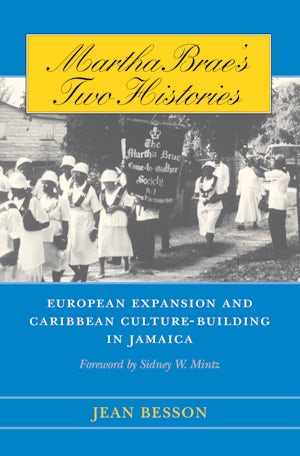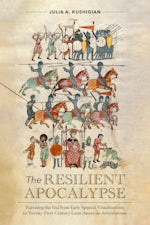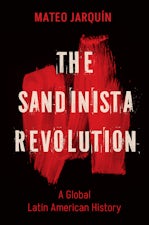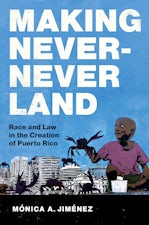Martha Brae's Two Histories
European Expansion and Caribbean Culture-Building in Jamaica
By Jean Besson
Foreword by Sidney W. Mintz

424 pp., 6.125 x 9.25, 20 illus., 5 maps, 1 table, notes, bibl., index
Not for Sale in the Caribbean
-
Paperback ISBN: 978-0-8078-5409-9
Published: November 2002
Buy this Book
Located at the gateway to the New World in the plantation heartlands of the Americas, the settlement of Martha Brae, Jamaica, has witnessed the unfolding of two distinct yet interrelated histories. Exploring the significance of Martha Brae as a European Caribbean slaving port in the eighteenth century, Jean Besson simultaneously uncovers the neglected tale of Martha Brae's gradual appropriation by ex-slaves and its transformation into an African Caribbean free village, bringing the story right up to the present day.
Central to this transformation is the system of "family land," which interrelates with kinship, community, economy, cosmology, gender, oral tradition, state law, and migration. Besson shows that this customary land tenure is not a passive legacy from either Africa or Europe, as conventional theories contend, but a dynamic creole institution created by Caribbean people in response to European American land monopoly and cultural dominance. This perspective advances debates on African American cultural history and the anthropological study of culture.
About the Author
Jean Besson, a Jamaican, is a senior lecturer in anthropology at Goldsmiths College, University of London.
For more information about Jean Besson, visit
the
Author
Page.
Reviews
"This book contributes to kinship theory beyond the Caribbean and to explicating the relationships among culture, land, and kinship in peasant economies. Academic libraries supporting anthropology programs on every level will want to have it. . . . Highly recommended."--Choice
"A fine testimony to the ways in which good regional ethnography can offer an important contribution to central concerns within anthropology."--Journal of Anthropological Research
"Besson's Martha Brae's Two Histories is an impressive work, bringing together various aspects of her scholarship, research and reflection upon her own biography. . . . The book is a welcome volume for all Caribbeanists as well as those who are interested in the contacts between Europe and Africa on the third site of contact and living-the Caribbean."--Ethnic & Racial Studies
"This book about Martha Brae is also a book about a world that Europe and Africa had made together--and not always unwillingly. Here we are afforded, by this daughter of two worlds, an inspiring and genuinely original vision of how the Jamaican people came into being and built their own society."--Sidney W. Mintz, from the Foreword
"Jean Besson's efforts in this book warrant high praise. Words that might come to mind to describe her accomplishment and contribution to Caribbean studies are 'essential reading' and 'of central importance,' but 'fundamental to our understanding of Caribbean society' is more apt. The book is full of wonderful detail, hard-wrought from thirty years of sympathetic ethnographic and oral history research by this politically committed 'daughter of the soil' and erudite anthropologist."--Kevin A. Yelvington, University of South Florida



